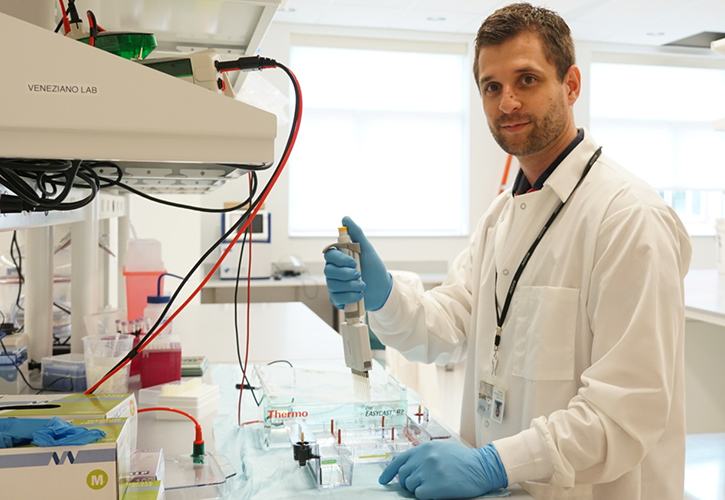“It’s a safe and elegant way to design vaccines.”
— Remi Veneziano, assistant professor in the Department of Bioengineering

Rémi Veneziano, an assistant professor in the Department of Bioengineering, is using DNA nanotechnology to lay the foundation for developing vaccines that could block infection from deadly viruses.
When Rémi Veneziano was growing up in France, he dreamed of becoming a scientist, wearing a lab coat, and doing experiments.
“I knew I wanted to do something related to science. I wanted to change the world. I was a dreamer.”
An assistant professor in the Department of Bioengineering, he is living his dream.
Veneziano is using DNA nanotechnology to lay the foundation for developing vaccines that could block infection from deadly viruses. One benefit could be defending populations from viruses used in potential bioterror attacks.
“It’s a safe and elegant way to design vaccines,” he says. “These would be new, efficient, and safer vaccine platforms that could apply to numerous infectious diseases that currently don’t have an efficient vaccine strategy.”
Nanotechnology involves manipulating matter on an atomic, molecular, and supramolecular scale.
Many biological mechanisms involving bacteria, viruses, and cells happen at the nanoscopic scale, which is very small and requires specialized techniques to investigate, says Veneziano, who conducts research at the Laboratory for Bio-Inspired Nanoarchitectures on the Science and Technology Campus in Prince William County. His lab is part of the Institute for Biohealth Innovation.
Before coming to Mason in the fall, he did research as a post-doc at the Massachusetts Institute of Technology, designing DNA-nanoparticles for HIV antigens presentation to immune cells to understand the relationship between the nanoscale organization of antigens and the immune response.
Veneziano is continuing that line of work here. “DNA is a fantastic polymer that is useful in building nanoparticles,” he says. “When working on the nanoscale, DNA can be made in the same shape of the virus, and modified with viral proteins to mimic viruses.”
The goal is to make the immune cells believe the nanoparticle is a virus and trigger an immune response. This research could lead to the faster, safer, and more cost-effective creation of vaccines, he says.
Michael Buschmann, chairman of the Department of Bioengineering, says, “Professor Veneziano’s DNA nanostructures are an amazing, versatile platform that can elucidate fundamental processes as well as be applied to a myriad of therapeutic applications in human health. We are truly fortunate to have him join our faculty.”
Veneziano says his colleagues at Mason “are very supportive and do everything they can to help. I felt I was part of their family right from the interview. I knew that I would be well integrated.”
Being a professor Mason is his dream job. “I love teaching. It’s so fulfilling. When you teach, you can see students understanding the concepts—you can see that in their eyes. I feel so good at the end of the day. I am tired because I give a lot of energy, but I love it,” he says.
And there’s the joy of doing research. “Every day I go to the lab, I’m happy and smiling. I love what I’m doing. When you are passionate about something, you enjoy what you’re doing.”
“Professor Veneziano’s DNA nanostructures are an amazing, versatile platform that can elucidate fundamental processes as well as be applied to a myriad of therapeutic applications in human health. We are truly fortunate to have him join our faculty.”
— Michael Buschmann, chairman of the Department of Bioengineering
